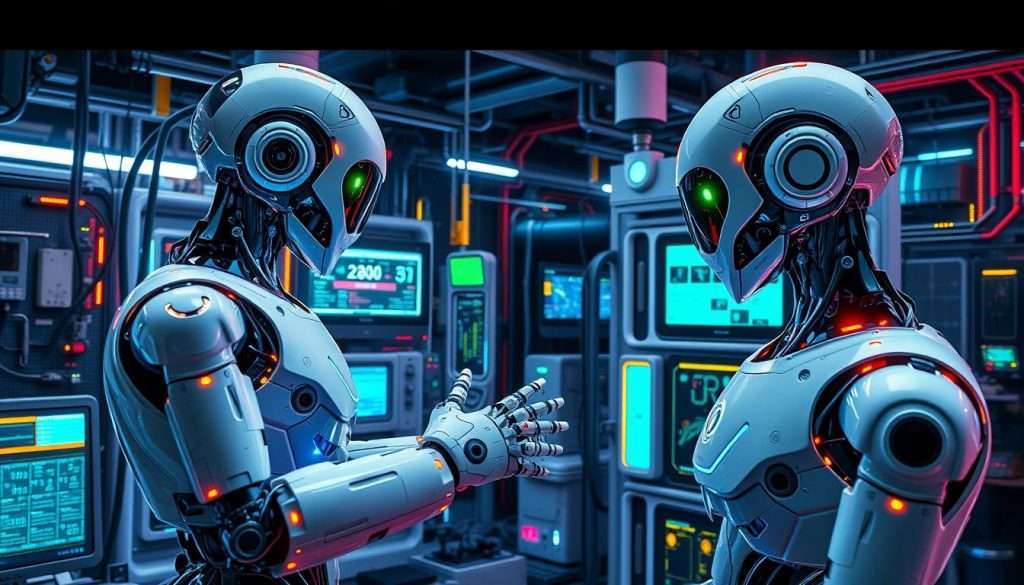Artificial Intelligence Effect on Jobs
The artificial intelligence (AI) revolution is changing work in big ways. A Goldman Sachs report says AI might replace 300 million jobs worldwide. This change is as big as the Industrial Revolution. So, how will AI change jobs, and what skills will we need?
How AI is Changing Jobs? AI is already changing jobs, with one million developers using GitHub Copilot. This tool changes how software is made. Big language models are making fewer junior and mid-level developers needed.
Generative AI will make learning faster and better, inside and outside work. It will also change how companies make big decisions. This includes finding the best prices and improving logistics.
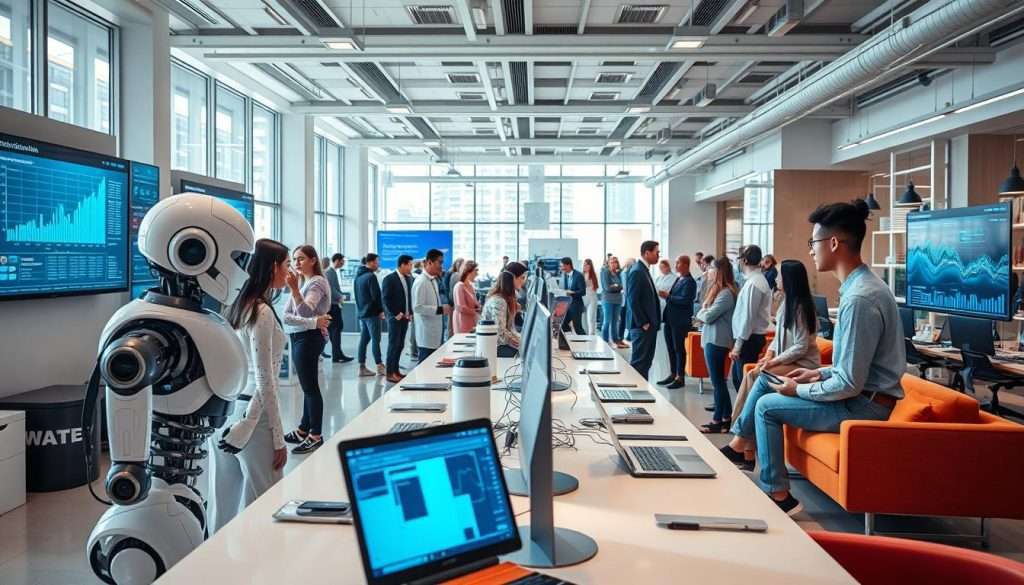
Key Takeaways
- AI has the potential to replace up to 300 million full-time jobs worldwide, reshaping the job market.
- One million developers are already using AI-powered tools like GitHub Copilot to generate code, transforming the software development industry.
- Generative AI is expected to accelerate personalized and applied learning, as well as decision-making processes in organizations.
- AI is reducing the need for junior and mid-level software developers, as large language models can significantly streamline product development.
- The future of work is evolving rapidly due to the current tipping point in AI advancements, signaling a paradigm shift in how work is carried out.
Understanding the AI Revolution in the Workplace
Artificial intelligence (AI) is changing the workplace fast. It brings new tech that changes how we work. For example, generative AI makes content and AI tools are everywhere.
ChatGPT, a big name in AI, got 100 million users in 60 days. This shows how fast AI is spreading in different fields.
Types of AI Technologies Transforming Work
AI is good at many things like making content and handling data. It also helps make big decisions. New machine learning and automation are changing work. They help people do their jobs better and faster.
The Scale of AI’s Impact on Employment
Studies say AI will change jobs more in white-collar fields. Jobs that involve being outside or doing physical work will change less. Jobs like accounting and banking will see big changes because they rely on productivity.
Current State of AI Implementation
Reports show 68% of top US executives want to spend more on AI. They focus on generative AI. Companies are making plans to use AI and find the right mix of AI, automation, and people.
By knowing how AI works, companies can do well in the changing tech world.
| Industry Sector | AI Exposure |
|---|---|
| Janitorial Services | Low |
| Meat Processing | Low |
| Coal Mining | Low |
| Accounting | High |
| Commercial Banking | High |
| Legal Services | High |
“By staying proactive and understanding the profound impacts of generative AI, businesses can strategically position themselves for success amidst the evolving landscape of technological advancements and industry transformations.”
The Artificial Intelligence Effect on Jobs: Current Trends and Statistics
Artificial intelligence (AI) is changing the job market. It’s not just taking over simple tasks. It’s also affecting jobs that need creativity and complex thinking. Finance, legal services, and healthcare are seeing big changes.
Studies show we’re not sure how much AI will change jobs. A 2013 study from the University of Oxford said 47% of US jobs could be automated by AI in 20 years. But, how much it really changes depends on many things.
Some jobs, like lawyers and surgeons, might not be replaced by AI. These jobs need skills that AI can’t do yet. This means AI and jobs might work together, not just against each other.
| Industry | AI Exposure | Potential Impact |
|---|---|---|
| Finance and Banking | High | Significant automation of tasks like financial analysis, portfolio management, and customer service |
| Media and Marketing | High | AI-generated content, personalized advertising, and automated customer interactions |
| Legal Services | Moderate | AI-powered legal research, document review, and contract analysis |
| Healthcare | Moderate | AI-assisted medical diagnosis, drug discovery, and patient monitoring |
| Education | Low | AI-powered tutoring, grading, and content creation, but high emphasis on human-centric skills |
As AI keeps changing the job world, workers need to stay adaptable. They should learn new skills and use AI tools wisely. Knowing the latest trends and stats helps people get ready for the AI revolution.
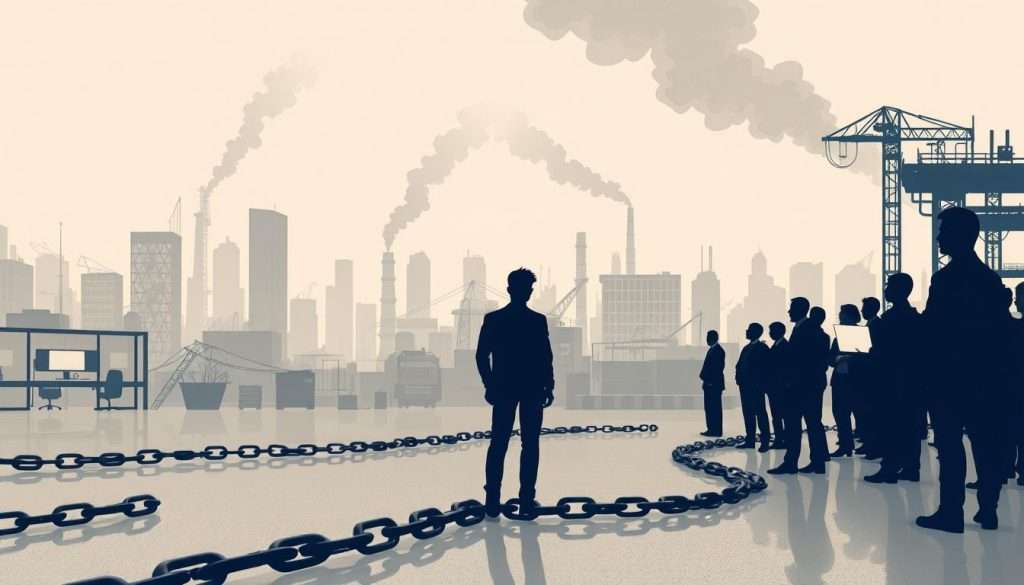
AI’s Impact on White-Collar Professions
Artificial intelligence (AI) is changing the job market, especially in white-collar jobs. It’s affecting industries like software development, finance, and healthcare. AI is making these fields work differently.
Software Development and Programming Changes
AI is changing software development a lot. It’s making it easier for startups to create digital products. But, it’s also making some jobs less needed.
While AI is important, some jobs are becoming less common. This includes jobs like coding.
Legal and Financial Services Transformation
AI is making legal and financial jobs more efficient. It’s doing tasks that used to take a lot of human time. This means jobs in these fields might change a lot.
AI is making some jobs less needed. This could lead to job losses in certain areas.
Healthcare and Professional Services Evolution
AI is also changing healthcare. It’s helping with diagnosis and planning patient care. It’s making healthcare jobs different.
AI is also changing jobs in accounting and consulting. It’s making tasks easier and helping with making decisions.
AI in white-collar jobs is complex. It brings both good and bad changes. Workers need to keep learning and adapting to these changes.
| Sector | AI Exposure | Impact |
|---|---|---|
| Software Development | High | Reduced demand for traditional coders, increased reliance on AI-powered “co-pilots” |
| Legal and Financial Services | High | Automation of manual research and data analysis, potential for job displacement in repetitive tasks |
| Healthcare | Moderate | Automation and personalization of processes, transformation of professional roles |
| Accounting and Consulting | High | Automation of data-driven tasks, enhanced decision-making capabilities |
A report by Goldman Sachs in 2023 said AI could lead to 300 million job losses in the US and Europe.
Job Displacement vs Job Creation in the AI Era
Artificial intelligence (AI) is changing the job market fast. It might take over some jobs, but it could also make new ones. This could lead to more jobs overall.
By 2030, AI could create 20-50 million new jobs worldwide. By 2025, it will take 75 million jobs but make 133 million new ones. This means a net gain of 58 million jobs. New jobs will include AI Trainers, Data Analysts, and more.
The manufacturing industry might lose jobs to AI. But, AI is making new jobs in high-tech manufacturing. In healthcare, AI helps doctors and nurses, making their work better and easier.
| Sector | Job Displacement | Job Creation |
|---|---|---|
| Manufacturing | Significant job displacement due to automation | New roles in data analysis, AI programming, and machine learning |
| Healthcare | Reduced workload for healthcare professionals | AI-assisted diagnosis and treatment recommendations |
AI might make some people wealthier if they have AI skills. But, it also brings new jobs and makes work more efficient. As AI grows, so will the need for skilled workers.
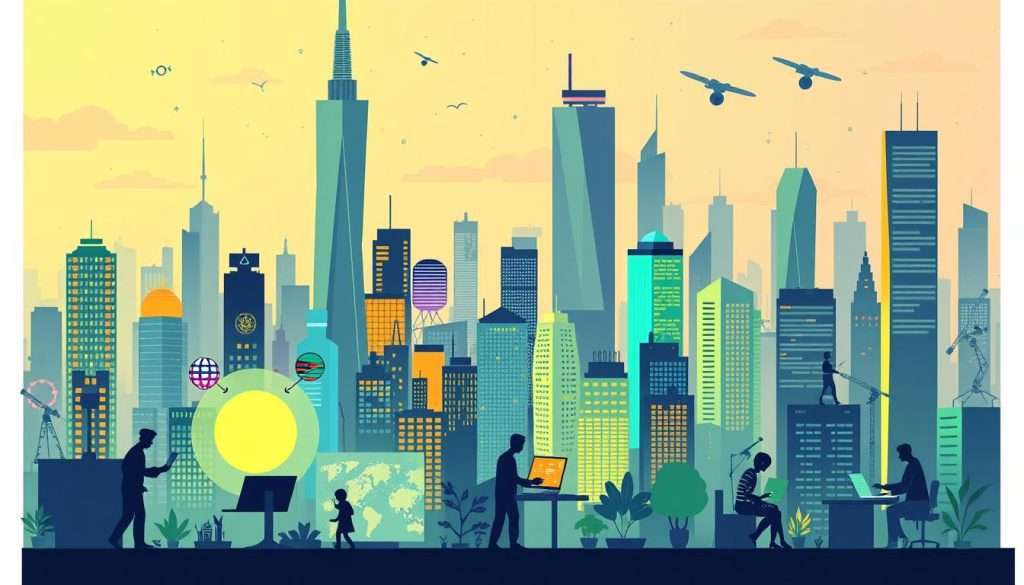
In conclusion, the AI revolution in work is complex. It might replace some jobs but also create new ones. This changes the future of work in big ways.
Skills and Workforce Adaptation for the AI Age
Artificial intelligence (AI) and machine learning are changing jobs. People in many fields need new skills to keep up. Learning to use AI tools well will give workers an edge.
Essential Skills for AI-Driven Workplaces
To do well in AI workplaces, you need certain skills. These include:
- Critical thinking and problem-solving
- Creativity and innovation
- Data analysis and interpretation
- Effective communication and collaboration
- Adaptability and lifelong learning
These skills help workers work well with AI. They also help them keep up with the future of work.
Upskilling and Reskilling Strategies
As AI changes work, we all need to learn more. Learning new things, both at work and outside, is key. Online classes, mentorship, and learning from others are good ways to get the skills needed for AI-affected jobs.
Future-Proofing Your Career
To keep your job safe, learn skills that go with AI. Always be ready to learn more. This way, you can succeed in the changing job market. Having technical, analytical, and soft skills is important for the AI-driven future of work.
“The future of work is a future of continuous learning and adaptation. Embracing AI and machine learning is not just about acquiring new technical skills, but also cultivating the mindset and versatility to thrive in an ever-changing, technology-driven landscape.”
AI as a Productivity Enhancer: Beyond Automation
The growth of artificial intelligence and automation has raised worries about job loss. Yet, research shows AI can boost worker productivity in many fields. It helps in tasks like writing, programming, customer service, and consulting.
AI tools are especially helpful for less-experienced workers. They make it easier to access knowledge and skills. This means workers can do more creative tasks, leading to happier and more innovative workplaces.
AI-driven platforms are changing how we work together. They help schedule meetings, translate in real-time, and offer learning paths. This ensures employees keep growing and staying competitive.
In fields that focus on safety, AI is key. It uses data to predict and prevent accidents. This approach greatly lowers the risk of injuries and deaths at work.
While AI might replace some jobs, it also creates new ones. Roles like AI Ethics Specialists, Machine Learning Engineers, and Data Scientists are emerging. It’s important to learn new skills to succeed in an AI-augmented world.
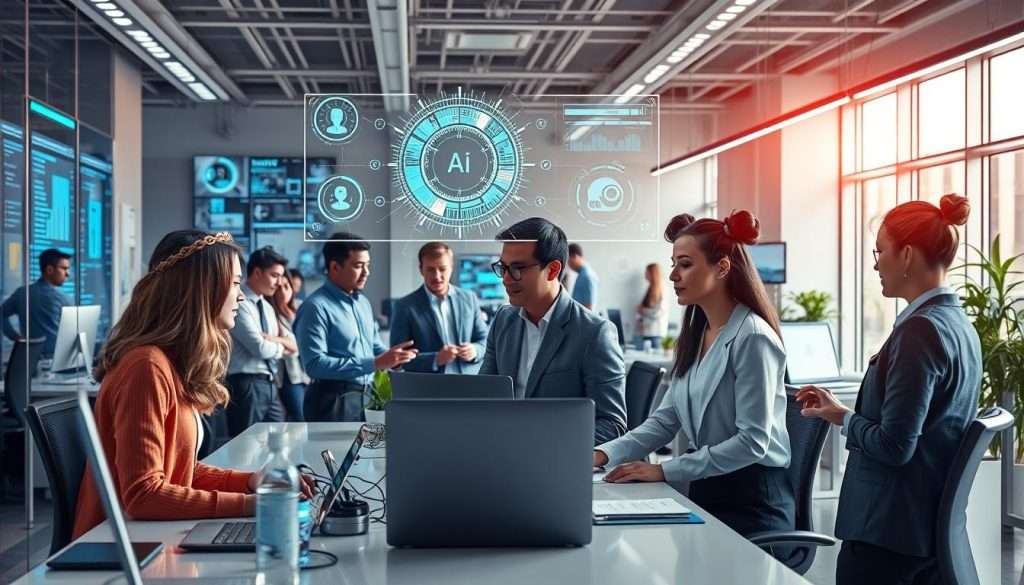
“The rise of artificial intelligence is not driving us towards a jobless future, but rather creating more job openings that require labor due to demographic changes and economic growth.”
– MIT Task Force on the Work of the Future
Challenges and Limitations of AI in the Workplace
Artificial intelligence (AI) is changing workplaces fast. It makes things more efficient and helps people do their jobs better. But, it’s not perfect. Knowing its limits helps us use AI wisely.
Technical Limitations and Reliability Issues
AI has made big strides, but it’s not flawless. It needs lots of data, which can be a problem. Sometimes, AI gives weird answers because it doesn’t really understand things.
Ethical Considerations and Bias Concerns
AI raises big ethical questions. It can make old biases worse, especially in hiring. Most employers use AI, but it can lead to unfair treatment of workers.
Implementation Challenges
Putting AI to work is hard. It affects jobs and fairness in different ways. AI is changing HR, but it can make people feel less important.
AI might create more jobs, but it could also make some jobs harder to get. This could hurt people who don’t have the right skills.
It’s key for companies to tackle AI’s challenges. By facing these issues head-on, businesses can use AI to improve work. This way, they can help their workers grow and stay relevant.
The Role of Human-AI Collaboration
Artificial intelligence (AI) is changing the workplace. It’s making decisions and giving insights. This is helping businesses make better choices.
AI is being tested to run entire businesses. Some think AI could be the next big thing in leadership. But, the best results come when humans and AI work together.
| Statistic | Insight |
|---|---|
| A study involving 1,500 firms in various industries shows that companies that automate operations mainly to reduce their workforces will experience only short-term productivity gains. | Businesses need to focus on redesigning their processes to get the most out of AI, improving operational flexibility, speed, scalability, decision-making, and personalization of products and services. |
| Accenture saw an 80% increase in automatic cash processing by implementing a machine-learning model for matching invoices and payments, reducing the need for manual entries. | AI-powered automation can significantly enhance productivity and efficiency when integrated seamlessly with human expertise. |
| CleaVision, a program in India, uses AI to deliver timely diagnoses for eye diseases to children in developing countries, showcasing the collaborative potential of AI and human expertise. | AI can complement and augment human capabilities, leading to better outcomes when combined with human decision-making and problem-solving skills. |
AI is getting better at many tasks. It’s helping doctors, translating languages, and serving customers. But, it’s not replacing humans. It’s working with them.
Keeping workers skilled is key as AI changes jobs. Training is needed to work well with AI. This teamwork is driving growth and innovation in businesses.
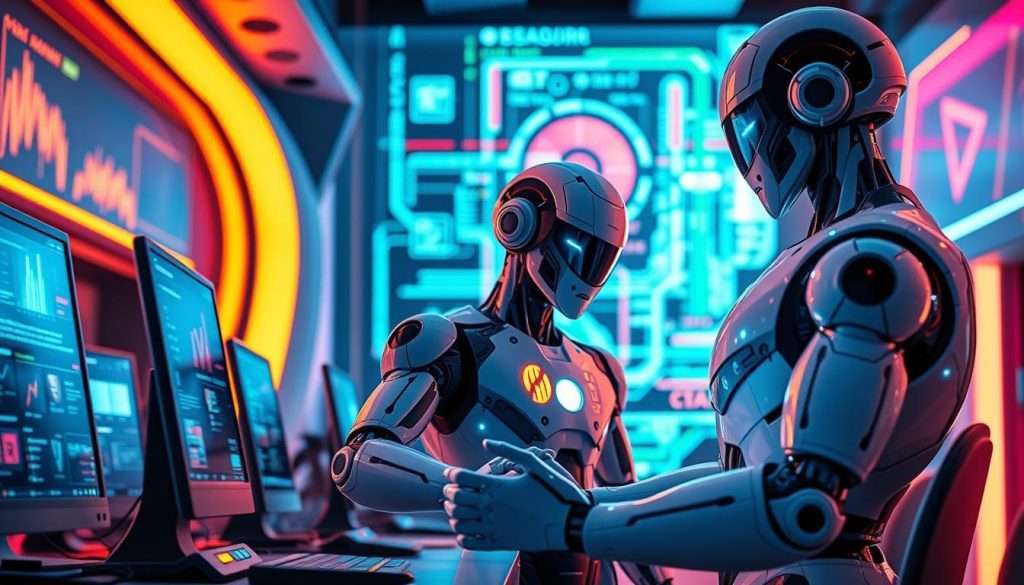
The ai augmented workforce and ai and future of work are evolving. The artificial intelligence and job world needs a balance. By working together, businesses can be more efficient and innovative.
Conclusion
Artificial intelligence (AI) is changing the job world a lot. It might not make jobs disappear right away. But, it’s making work change a lot because of new AI tech.
AI is making work better and faster in many fields. This includes software, law, health care, and more. It’s also making new jobs like data analysts and AI ethicists. But, it’s also changing how we work.
We need to keep studying how AI affects jobs. We should look at its tech, ethics, economy, and social sides. Workers need to learn new skills like talking well, being kind, and creative. This will help them keep up in an AI-driven economy.
As artificial intelligence effect on jobs and AI job creation keep changing work, we must find a good way to use AI. We need to work with AI, not just use it. This will help us move forward well together.
FAQ
What is the impact of AI on jobs?
Goldman Sachs says AI could replace up to 300 million jobs. This is like the Industrial Revolution’s impact. AI is changing many fields, like healthcare and education, making processes more efficient.
How is AI affecting software development and programming?
AI is making fewer software developers needed. Startups use AI tools like GitHub Copilot instead of coders. But, they still need tech leaders and AI experts.
How is AI impacting white-collar professions?
AI is changing jobs in law, finance, and healthcare. It makes tasks easier and faster. But, jobs that need a lot of education and pay well might change a lot.
Will AI lead to job displacement or job creation?
AI might replace some jobs but also create new ones. It makes work more interesting by doing simple tasks. But, how much it changes jobs is still unclear.
What skills are essential for workers in the AI age?
Workers need to learn new skills as AI changes jobs. Knowing how to use AI well is key. Learning new things quickly will help people keep up with job changes.
How can AI enhance worker productivity?
AI can make workers more productive in many areas. It helps with writing, programming, and more. Even less-skilled workers see big improvements.
What are the limitations and challenges of AI in the workplace?
AI has its limits, like bias and unpredictable results. Knowing these is important for using AI wisely. There are also ethical and practical challenges to overcome.
What is the role of human-AI collaboration in the future of work?
Humans and AI will work together more in the future. AI helps make big decisions in businesses. It could even make decisions for whole companies.
more article: https://msmgadgets.com/blog/

